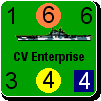Courtenay
Posts: 4003
Joined: 11/12/2008
Status: offline

|
In one of the current AARs, the US just declared war on Germany. A few US naval units attempted to move through the North Atlantic, which was occupied by many CW units and at least one German SUB. The German SUB successfully intercepted, and the US stopped in the sea area.
What would have happened if the US had attempted to fight through? If the CW ships had found, then there would have been a battle where neither side had much surprise (since both sides found), and the Germans would probably have come off worse. My question is what would happen if the Allies did not find with their other units. The battle would have just been between the US ships and the Germans; the Germans could not add in any other Allied units in the sea area to the battle, because that is the way interception works. The question is, would the Germans have suffered the effects of surprise? The rule reads:
quote:
If a port attack or a naval combat at sea only involves units controlled by major powers declaring war, and the major powers they are declaring war on, the surprised units always get 0 surprise points. The attacking major powers get the normal number (this will increase the number of net surprise points the attacker can spend, if there is any combat).
Clarification: A surprised major power may attempt to intercept a moving enemy naval force but if they do so, they get zero surprise points.
The question is what does "involve" mean? There are CW units in the sea area, but only US units are participating in the combat. I would think that means that the CW is not "involved", but am not sure. If only the US has units involved then the US would have a surprise advantage, and it would not matter if the Allies rolled a 10 for their search.
If the Allies do not find, are the Germans surprised, or not? (They clearly aren't if the CW finds, but then the Germans have other problems.)
_____________________________
I thought I knew how to play this game....
|
 Printable Version
Printable Version









 New Messages
New Messages No New Messages
No New Messages Hot Topic w/ New Messages
Hot Topic w/ New Messages Hot Topic w/o New Messages
Hot Topic w/o New Messages Locked w/ New Messages
Locked w/ New Messages Locked w/o New Messages
Locked w/o New Messages Post New Thread
Post New Thread